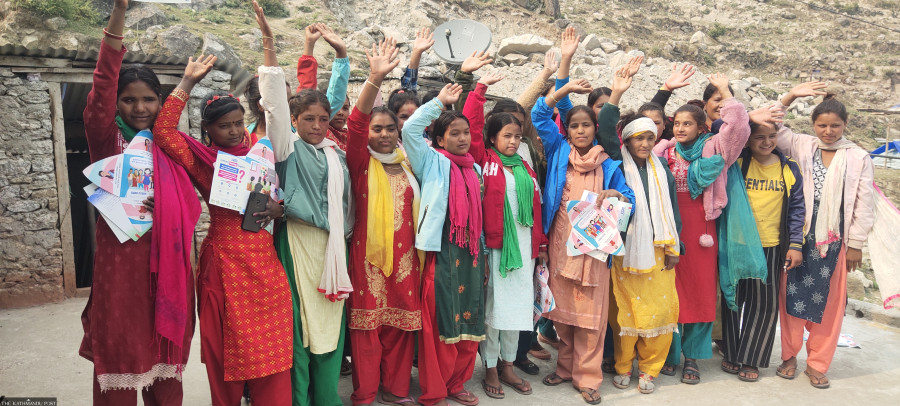Karnali Province
Schoolgirls come together to combat outdated pratices
Young girls rally against social ills, urging female relatives to shun harmful traditions like Chhaupadi, child marriage and caste-based discrimination.
Tularam Pandey & DB Budha
Seventeen-year-old Anju Bista of ward 1 of Naraharinath Rural Municipality in Kalikot district stopped practising Chhaupadi two years ago. She experienced her first period at the age of 14. Since then she was banished to the animal shed for four days by her parents and grandparents following a practice known as Chhaupadi.
Anju later became a member of a girl’s group—Champion of Change, formed in her secondary school in Naraharinath Rural Municipality. The local unit has involved adolescent girls to effectively fight social problems and evil practices.
After discussions in the group, Anju and her friends decided to put the evil practice to an end and refused to live in sheds during menstruation. The girls highlighted the risks involved. “There was the risk of snakebites while staying in the shed during summer and rainy seasons. And during the winter months, one would fall sick due to cold. So, we collectively decided not to practice Chhaupadi and instead stay in the house during our period,” said Anju.
The adolescent girls organised under the girl’s group also urged their mothers, aunts, sisters and sisters-in-law not to perpetuate this social evil. They warned the family members to stop practising Chhaupadi. Their campaign has become successful in putting an end to Chhaupadi tradition in the village, says Anju.
“Nobody lives in sheds during their period these days. Menstruating girls and women stay in separate rooms in the house,” she said. “Earlier, menstruating girls and women were not allowed to consume milk and milk products, but these days our family members let us consume ghee.”
Chhaupadi is a flawed tradition connected to the taboo surrounding menstruation that prohibits Hindu women from participating in normal family activities while on their period, as they are considered impure. It is a menstrual exile in which girls and women in period and even the postpartum mothers are kept in a secluded place outside the house.
The Champion of Change group formed in the secondary schools in Naraharinath Rural Municipality has launched campaigns against Chhaupadi, child marriage, and caste-based discrimination, among other social evils.
“Members of Champion of Change have been organising an awareness campaign in the village. The school also calls guardians’ meetings regularly and educates them about social problems and evils. The group has also been helpful in controlling dropouts and encouraging students, mainly girls, to be regular in their classes,” said Harishchandra Batala, the headmaster at Rama Secondary School in Kumalgaun. According to him, the school has arranged for a room where girls undergoing menstruation can rest. It also provides them sanitary pads.
Adolescent school girls have become role models for uprooting such problems and evils in the rural municipality. “We have been launching a campaign in our village urging people not to practice Chhaupadi. We meet the people who force the family members to practice the tradition and counsel them,” said Anju Budha of ward 3 of Naraharinath.
Secondary schools in Lalu, Malkot, Rupsa, Kotwada and Kumalgaun have formed the Champion of Change group to fight social evils.
Man Bahadur Bista, a member of ward 1 of Naraharinath Rural Municipality, said the ward office and rural municipality provided some budget to the group.
Fourteen-year-old Pramila Rokaya, an eighth grader at Rahadev Secondary School in Sinja of Jumla district, has been actively involved in the campaign launched against social evils for the past three years. Pramila and her friends frequently convene meetings of women’s groups, religious priests and other local leaders and urge them to stand against various social evils like Chhaupadi, child marriage and caste-based discrimination.
A group of 50 adolescent girls have been conducting similar campaigns in the Mophla and Deyar villages of Hima Rural Municipality in Jumla. In the past 10 months, they have managed to prevent three child marriages. The girls also encourage people to send their children to schools for education.
Gaurinanda Acharya, chief of the District Coordination Committee, hailed the roles of adolescent girls in combating social evils. “They have been actively working to end social problems and evils. They coordinate with mothers’ groups, religious communities and guardians. They urge or sometimes pressure guardians to send their children, mainly daughters, to school,” said Gaurinanda.
As per the data available at the District Police Office in Jumla, three incidents of child marriage were prevented in the district in the fiscal year 2021-22. Similarly, a total of 15 child marriages were prevented in the last fiscal year of 2022-23.




 22.12°C Kathmandu
22.12°C Kathmandu
















